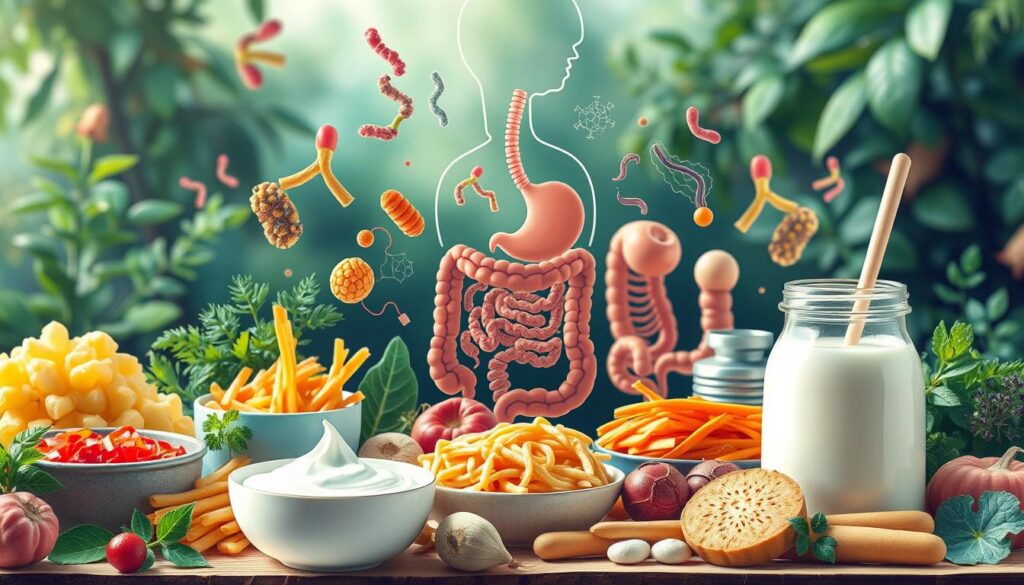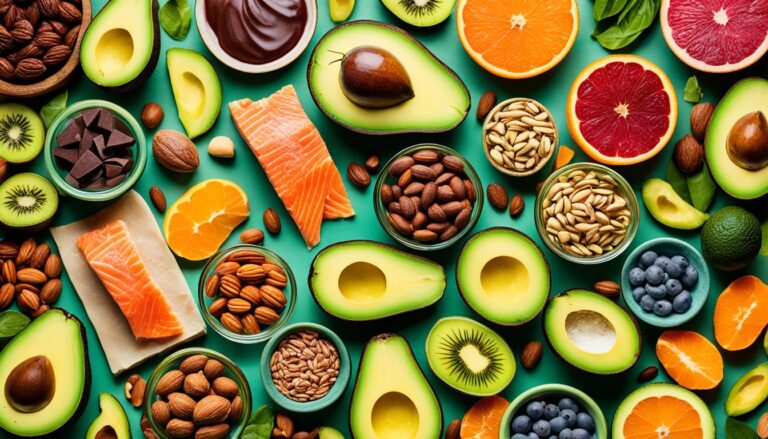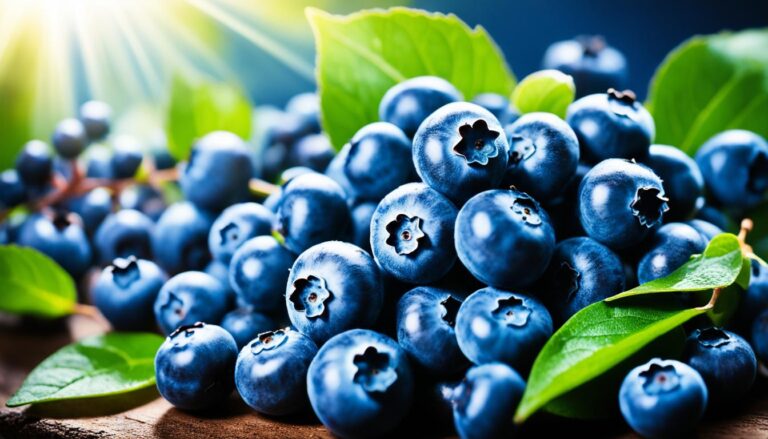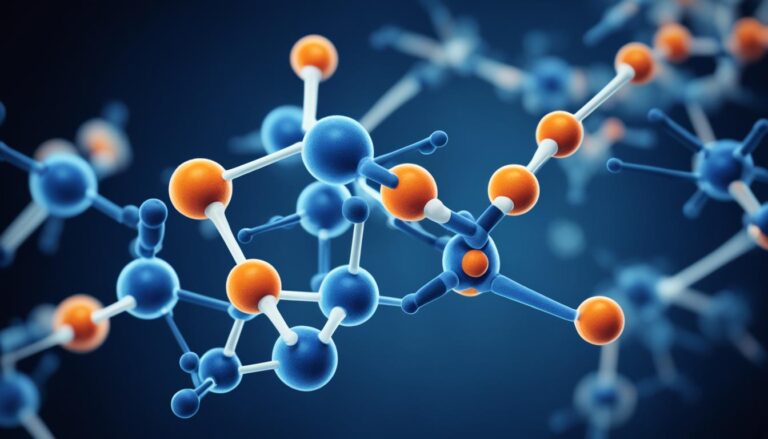Have you ever wondered why some people seem to thrive while others struggle with energy and digestion?
The answer might lie in the gut microbiome, a complex ecosystem of bacteria that plays a crucial role in overall health and nutrition.
Modern diets often lack essential components like fermented foods and natural supplements. These are key to maintaining a balanced gut. Maria Garcia Luis a renowned nutritionist suggests starting slowly with probiotic rich options to avoid overwhelming your system.
Fermented foods like yogurt, sauerkraut, and kimchi are excellent choices. They not only support digestion but also enhance nutrient absorption. Pairing these with adaptogens can further boost your body’s resilience and vitality.
Key Takeaways
- The gut microbiome is vital for overall health and well-being.
- Modern diets often miss essential components like fermented foods.
- Probiotic-rich foods can improve digestion and nutrient absorption.
- Adaptogens can enhance your body’s resilience and energy levels.
- Start slowly with probiotic foods to avoid overwhelming your system.
Why Healthy Foods Adaptogens, and Probiotics Matter
The connection between what we eat and how we feel is stronger than many realize. Our diet directly impacts our health, energy levels, and even mental clarity. Incorporating the right nutrients can make a significant difference.
Adaptogens, such as ashwagandha and reishi mushrooms, are natural stress relievers. Jenna Volpe, R.D.N., explains These herbs help balance the immune system and combat the effects of chronic stress.Adding them to your routine can enhance resilience and overall well being.

Probiotics, like Lactobacillus and Bifidobacterium strains, play a crucial role in digestion and immune support. They help maintain a balanced bacteria gut, which is essential for nutrient absorption and reducing inflammation.
Poor gut health can lead to fatigue, chronic conditions, and even mood disorders. The National Institutes of Health NIH recommends consuming 25-30 grams of fiber daily to support a healthy microbiome. Whole foods, such as fruits, vegetables, and legumes, are the best sources of fiber and other essential nutrients.
Whole foods provide a spectrum of nutrients that supplements simply can’t match,says Maria Garcia Luis, a renowned nutritionist.
Here’s a quick comparison of whole foods versus supplements:
| Whole Foods | Supplements |
|---|---|
| Rich in fiber, vitamins, and minerals | Often lack fiber and essential nutrients |
| Promote long-term wellness | May provide short-term benefits |
| Support a balanced microbiome | Limited impact on gut health |
Choosing whole foods over supplements ensures you get the full range of benefits for your health. A balanced diet, combined with adaptogens and probiotics, can transform your life for the better.
What Are Probiotics and Why Are They Important?
The gut is often called the ‘second brain’ for its impact on overall wellness. At the heart of this system are probiotics, live microorganisms that colonize the gut and support its balance. These beneficial bacteria play a vital role in digestion, immunity, and even mental health.

Understanding Probiotics
Probiotics are primarily composed of two dominant genera: Lactobacillus and Bifidobacterium. Strains like Lactobacillus acidophilus and Bifidobacterium longum are commonly found in fermented foods like yogurt and miso. These strains produce enzymes that enhance nutrient absorption and promote a healthy gut environment.
Benefits of Probiotics
Incorporating probiotics into your diet can address common digestive issues like bloating and diarrhea. Studies show they also support immune function and may help manage conditions like irritable bowel syndrome IBS. Additionally, probiotics have been linked to improved vaginal health and reduced inflammation.
While probiotics offer numerous benefits, moderation is key. Overconsumption of kombucha, for example, can lead to digestive distress,warns Maria Garcia Luis, a renowned nutritionist.
By fostering healthy bacteria in the gut, probiotics can transform your digestive health and overall well-being. Start with small, consistent doses to avoid overwhelming your system and enjoy the long-term benefits of a balanced microbiome.
Top Probiotic Rich Foods to Include in Your Diet
Incorporating the right foods into your diet can transform your gut health and overall wellness. Probiotic-rich options are essential for maintaining a balanced microbiome, which supports digestion, immunity, and more. Below are some of the best choices to consider.

Yogurt
Yogurt is one of the most popular probiotic foods. Look for products with the Live & Active Culturesseal to ensure they contain beneficial bacteria. However, be cautious of added sugars, which can negate the health benefits. Opt for plain, unsweetened varieties for the best results.
Sauerkraut and Kimchi
Sauerkraut and kimchi are fermented cabbage dishes packed with probiotics. Unpasteurized versions retain live bacteria, while pasteurization kills these beneficial microbes. Always refrigerate these products to maintain their potency. Kimchi also offers vitamins A, B, and C, making it a nutrient-dense choice.
Other Probiotic Foods
Beyond yogurt and fermented cabbage, there are many other options to explore. Tempeh and natto, both made from fermented soy, are rich in B vitamins and probiotics. Lesser-known choices like pickled beets, sourdough bread, and cheddar cheese also provide gut-friendly bacteria.
Start with one probiotic food daily to avoid gastrointestinal discomfort,advises Maria Garcia Luis, a renowned nutritionist.
By gradually introducing these foods into your diet, you can support your gut health without overwhelming your system. Whether it’s yogurt sauerkraut or tempeh, each option brings unique benefits to your table.
Exploring Adaptogens Natural Stress Relievers
Stress is an inevitable part of life, but managing it effectively can make all the difference. Adaptogens are a group of herbs that help the body adapt to physical and emotional stress. These natural remedies have been used for centuries in traditional medicine and are now gaining modern recognition for their health benefits.
What Are Adaptogens?
Adaptogens are non-toxic herbs that regulate the body’s stress response. Examples include ashwagandha, ginseng, and reishi mushrooms. These herbs work by balancing cortisol levels, which can improve mental clarity and reduce fatigue. Jenna Volpe, R.D.N., explains, Adaptogens help the body maintain equilibrium, even during challenging times.
Health Benefits of Adaptogens
Adaptogens offer a range of health benefits. For instance, cordyceps can enhance focus, while reishi mushrooms promote better sleep. They also support blood sugar control and hormone health, making them a versatile addition to any wellness routine.
Here’s a quick overview of how adaptogens can benefit you:
| Adaptogen | Primary Benefit |
|---|---|
| Ashwagandha | Reduces stress and anxiety |
| Reishi | Improves sleep quality |
| Cordyceps | Boosts energy and focus |
Adding powdered adaptogens to smoothies or stir-fries is an easy way to incorporate them into your diet. However, Jenna Volpe advises, Always consult a doctor before using adaptogens, especially if you’re on medications.
By supporting the body’s natural resilience, adaptogens can help you thrive in today’s demanding world. Whether you’re looking to improve sleep, enhance mental clarity, or balance hormones, these herbs offer a natural solution.
Healthy Foods That Support Gut Health
The foods you eat play a pivotal role in maintaining a balanced and thriving gut microbiome. A diet rich in fiber and prebiotic foods can significantly enhance your gut health, supporting digestion, immunity, and overall wellness.
Fiber-Rich Foods
Fiber is essential for a healthy gut. It feeds beneficial bacteria, promoting their growth and activity. Foods like steel cut oats, flaxseeds, and leafy greens are excellent sources. Aim for 30 grams of fiber daily to support your microbiome.
Unpeeled apples are another great choice. Their pectin-rich skins enhance microbiome diversity, fostering a balanced environment. Including these in your diet can improve digestion and reduce inflammation.
Prebiotic Foods
Prebiotic foods act as fuel for probiotics, helping them thrive. Garlic, onions, and bananas are rich in prebiotics. These foods produce short-chain fatty acids, which have anti-inflammatory properties and support immune function.
Ashley Baumohl, R.D., emphasizes, Prebiotics are critical for bacterial growth and immune function. They work in synergy with probiotics to optimize gut health.
By combining prebiotics and probiotics, you create a powerful duo that enhances nutrient absorption and promotes long-term wellness. Start incorporating these foods into your meals for a healthier, happier gut.
Conclusion Incorporating Healthy Foods Adaptogens and Probiotics into Your Routine
Building a balanced lifestyle starts with the right choices in your daily routine. Prioritize fermented foods, adaptogen rich herbs and fiber to support your healthy gut. These elements work together to enhance digestion, immunity, and overall wellness.
For a convenient way get these benefits, consider products like Ka’Chava Superblend. It combines adaptogens and probiotic supplements into one easy-to-use option. Pairing dietary changes with stress management techniques can further amplify your results.
Maria Garcia Luis advises, Gradually introduce new foods to avoid gastrointestinal discomfort.Consulting a dietitian can also help create a personalized plan, especially if you have medical conditions.
By making small, consistent changes to your diet, you can achieve long-term health and vitality. Start today and take the first step toward a healthier you.





